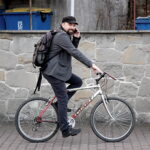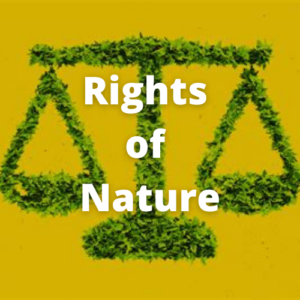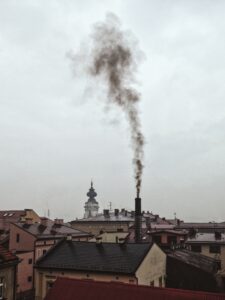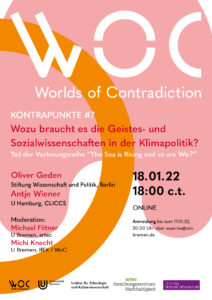Vergangenes: 2022
-
1.7.2022 Andrea Ballestero. University of Southern California. „Aquifers: Ethnography at the Edges of a Concept“
-
21.6.2022 Olivia de Beek, Amina Ceesay, Janna Dohmann, Kim Harrie, Nele Müller, Andrea Muehlebach. University of Bremen. „Rights of Nature“. Student Research Roundtable Discussion.
Vortrags- und Diskussionsrunde von Andrea Mühlebach und Studierenden des Kurses „Rights of Nature“
Erneut eine Veranstaltung im Rahmen des Institutskolloquiums, die zusammen mit dem Bremen NatureCultures Lab organisiert wurde.
Studierende des „Rights of Nature“-Seminars von Andrea Muehlebach präsentieren ihre Forschungen zur Fragen, wie die Natur zur Zeit in vielen Teilen der Welt als Rechtssubjekt anerkannt wird, wie die Natur in dieser neuen „earth jurisprudence“ von einer Ressource und von einem Objekt in ein Subjekt verwandelt wird und wie dieses neue Rechtssubjekt vor Gericht „sprechen“ bzw. zum Sprechen gebracht werden kann. Wie hören Menschen der Natur – in der Form von Flüssen, Gletschern, ganzen Ökosystem – zu und wie können die Rechte dieses neuen Subjekts eingeklagt werden? Wir tauchen ein in das historische Konzept von „dominion“, in die Gerichtsverfahren gegen Tiere im Mittelalter, in das International Tribunal on the Rights of Aquatic Ecosystems und die Frage, was die rapide sich wandelnden Kategorien wie „Natur“, „zukünftige Generationen“, „Eigentum“ und „der Mensch“ überhaupt noch sind.
Die Forschungen werden im Rahmen eines multimodalen Films präsentiert, und das Team steht nachher zur Diskussion bereit.
Dienstag, 21. Juni 2022 – 18:15h | Rotunde, Cartesium U Bremen (Enrique Schmidt-Str. 5)
HYBRID-EVENT – Registrierung für Online-Teilnahme: per E-Mail an xiaoling_at_uni-bremen.de
-
14.6.2022 Mateusz Klinowski. Jagiellonian University, Krakow. „Is Air Pollution a Wicked Problem? Lessons from Poland.“
The Bremen NatureCultures Lab and the Department of Anthropology and Cultural Research at the University of Bremen are pleased to welcome Mateusz Klinowski from Jagiellonian University Krakow as guest scholar in the second half of June, 2022. He will start his two-week guest stay with a lecture – a joint event of the Bremen NatureCultures Lab and the IfEK’s Institute Colloquium.
14 June 2022 | Tuesday evening: 18:15-19:45
Mateusz Klinowski | „Is Air Pollution a Wicked Problem? Lessons from Poland“Hybrid Event: Rotunde (Cartesium) or Online (zoom)
Location Address: Cartesium, Enrique-Schmidt-Str. 5, U Bremen
For online attendance via zoom: Please email xiaoling_at_uni-bremen_dot_de by June 14, 2022, to register.Abstract: Air pollution and other environmental and climate protection issues are often described as wicked problems – the problems particularly difficult to solve. The category of wicked problems has been developed in the social sciences since the ’70s. The anti-smog resolutions passed in the province of Lesser Poland in 2016 and 2017 introduced two different regulatory regimes in the city of Krakow and the rest of the province, respectively, corresponding to two different philosophies for solving societal problems – enforcement vs economic incentives. I saw it as a rare opportunity to directly measure the effectiveness of adopted anti-smog laws, and thus to estimate the effectiveness of the two different competing regulatory regimes mentioned above. The dynamics characteristic for wicked problems is observed, but this is due to the phenomenon I proposed to call the institutional inertia. After all, some wicked problems may be easy to solve, but there is no one really interested in doing so in the first place.
 Mateusz Klinowski is adjunct professor at the Faculty of Law and Administration, Jagiellonian University in Krakow (Poland) and member of the Rector’s Climate Council. He studied philosophy and law at the Jagiellonian University, where in 2007, he also received a doctoral degree specializing in the theory of law. He was visiting professor at the San Juan Law School in Puerto Rico and visiting fellow at Alicante University and at the School of Philosophy of Law and Social Sciences in Göttingen. His academic interests include philosophical logic, logic of action, methodology of science, ethics, including bioethics, and political theory. Besides being an academic, he is a political activist – among others in the field of air pollution, was elected mayor of Wadowice (2014-2018) and is co-founder and member of Energia Miastm, a NGO of Polish local politicians and activists promoting progessive policies.
Mateusz Klinowski is adjunct professor at the Faculty of Law and Administration, Jagiellonian University in Krakow (Poland) and member of the Rector’s Climate Council. He studied philosophy and law at the Jagiellonian University, where in 2007, he also received a doctoral degree specializing in the theory of law. He was visiting professor at the San Juan Law School in Puerto Rico and visiting fellow at Alicante University and at the School of Philosophy of Law and Social Sciences in Göttingen. His academic interests include philosophical logic, logic of action, methodology of science, ethics, including bioethics, and political theory. Besides being an academic, he is a political activist – among others in the field of air pollution, was elected mayor of Wadowice (2014-2018) and is co-founder and member of Energia Miastm, a NGO of Polish local politicians and activists promoting progessive policies. -
27.4.2022 Christopher Kelty (UCLA) and Andrew Gilbert (Bremen). „(Un)making the Academic Podcast.”
(Un)Making the Academic Podcast – Workshop for Students
Wednesday, April 27, 2022 | 09:00-12:00 | Location: SFG 2010
Abstract: This workshop is a critical and playful examination of the podcast as a form of research communication, using as a case study the podcast series of the Labyrinth Project (https://labyrinth.garden/), a collaborative inquiry into human-nature entanglements in Los Angeles and convened by Chris Kelty. The workshop will be collaborative and include listening, discussion, the reverse engineering of a podcast episode, and a prototyping design exercise. In particular, the workshop will explore the questions: What kind of a publication is the academic podcast? What can it offer for the analysis and communication of complex naturecultures? In short: what can the podcast do and what are its limits.
Christopher M. Kelty is professor at the University of California, Los Angeles. He has appointments in the Institute for Society and Genetics, the department of Information Studies and the Department of Anthropology. His research interests center on social theory and technology, the cultural significance of information technology; the relationship of participation, technology and the public sphere; and more recently, the role that wild animals play in contemporary urban Los Angeles. He has written two books: The Participant: A Century of Participation in Four Stories (Chicago, 2019), and Two Bits: The Cultural Significance of Free Software (Duke University Press, 2008) in addition to written articles on open source and free software, including its impact on education, nanotechnology, the life sciences, participation as a political concept, open access in the academy, piracy, the history of software, hackers and hacking, and many other diverse topics.
Andrew Gilbert is Senior Researcher in the Department of Anthropology and Cultural Research as well as the NatureCultures Lab at the University of Bremen, and also has an appointment in the Department of Anthropology and Ethnography Lab at the University of Toronto. His research explores the possibilities and politics of social transformation in contexts of historical upheaval, be it international intervention in the aftermath of war, labor struggles to protect the possibility of a secure livelihood, or citizen activism to preserve urban life-worlds from the diverse forces that would undermine them. In addition to over twenty years of research experience in Bosnia-Herzegovina (which has resulted in a number of publications in traditional formats), he brings an interest in multimodality, developed through an ongoing collaborative graphic ethnography project (https://reclaimingdita.com/), as well as other formats, including a collaborative photo essay, a collaborative multi-media panel, and podcast.
-
26.4.22 Christopher Kelty on absurdities of governing animals in LA
We are looking forward to inviting you to the first of three NatureCultures Lab events of the summer term – organised together with the Department of Anthropology and Cultural Research at the University of Bremen, and held as joint sessions with the institute colloquium.
26 April (Tue) | 18-20h | Rotunde (Cartesium) **
Christopher Kelty (University of California, Los Angeles)“Absurd Resistance: Political Governance of Animals in Los Angeles”
**Hybrid Event
Location Address: Cartesium, Enrique-Schmidt-Str. 5, U Bremen
For online attendance: Please email xiaolingATuni-bremen.de by April 26, 2022, to register.
(Please be aware of the German „academic quarter“, which means the event starts at 18:15)Abstract: This talk considers some absurdities of governance in Los Angeles: an attempt to non-lethally manage coyotes, who eat pet cats and dogs; an attempt to care for community cats, who eat birds and other endangered species; and an attempt by an oil company to restore a wetlands belonging to Native Americans, so that the birds will come back. These absurdities take shape in the technopolitical tools of environmental governance: Environmental Impact Reports slow what people want to accelerate, and accelerate what people wish to slow; a dispersed social media public sphere summons cloud coyotes and turns grasslands into astroturf; and sophisticated scientific models of hydrology, habituation, and cat reproduction disclose the truth but cannot find a space where they can have an effect. Are these forms of resistance, and if so, to what? Is their absurd interconnection something that should be resisted, or just the revenge of multispecies entanglement or the ruins of representative democratic institutions? What do the animals say?
Christopher M. Kelty is professor at the University of California, Los Angeles. He has appointments in the Institute for Society and Genetics, the department of Information Studies and the Department of Anthropology. His research interests center on social theory and technology, the cultural significance of information technology; the relationship of participation, technology and the public sphere; and more recently, the role that wild animals play in contemporary urban Los Angeles. He has written two books: The Participant: A Century of Participation in Four Stories (Chicago, 2019), and Two Bits: The Cultural Significance of Free Software (Duke University Press, 2008) in addition to written articles on open source and free software, including its impact on education, nanotechnology, the life sciences, participation as a political concept, open access in the academy, piracy, the history of software, hackers and hacking, and many other diverse topics.
-
1.2.2022 Dwelling in the Inhabited Sea | Final Lecture of „The Sea is rising…“-Series
We are happy (but also a little sad) to announce the last lecture of the
Lecture Series „The Sea is Rising – And So are We? Klimawandel und sozialökologische Transformation“.Tue, 1 February 2022 / Online – 18:15-19:45
Nikil Anand (University of Pennsylvania)
Dwelling in the Inhabited SeaTo receive the zoom link please register by writing an email to seasrise@uni-bremen.de until 20h the evening before.
Abstract: As coastal cities face accelerating rising sea levels and an increased frequency of extreme weather events, Inhabited Sea is a transdisciplinary research collaborative of designers, planners, scientists, and artists that draws attention to the ways in which human and non-human life dwell in wet cities. Working together since 2019, the collaborative asks what kinds of urban processes are brought into view when attending to how life is made in and with water. In this lecture, Anand presents some findings of this work to show how the practices of human and non-human dwelling in the mixtures of urban wetscapes problematize flat and linear practices (of planning, design, and engineering) with which cities are made and maintained. Inhabited Sea instead calls for an attention to the cyclical temporalities, the tenuousness, and the stories with which cities are occupied in the meantime, between the catastrophic events of the past and future.
For more information please take a look at the following website:
https://www.inhabitedsea.org/urban-seaDetails: Flyer
-
18.2.2022 Wozu braucht es die Geistes- und Sozialwissenschaften in der Klimapolitik?
Joint event of Lecture Series „The Sea is Rising – And So are We? Klimawandel und sozialökologische Transformation“, Bremen NatureCultures Lab and World of Contradiction Kontrapunkte #7 – Wissenschaft im Widerspruch
in German language.Details: Flyer seasrising_geden+wiener
Anmeldung via E-Mail: seasrise_at_uni-bremen.de
- 1.7.2022 Andrea Ballestero. University of Southern California. „Aquifers: Ethnography at the Edges of a Concept“
- 21.6.2022 Olivia de Beek, Amina Ceesay, Janna Dohmann, Kim Harrie, Nele Müller, Andrea Muehlebach. University of Bremen. „Rights of Nature“. Student Research Roundtable Discussion.
- 14.6.2022 Mateusz Klinowski. Jagiellonian University, Krakow. „Is Air Pollution a Wicked Problem? Lessons from Poland.“
- 27.4.2022 Christopher Kelty (UCLA) and Andrew Gilbert (Bremen). „(Un)making the Academic Podcast.”
- 26.4.22 Christopher Kelty on absurdities of governing animals in LA
- 1.2.2022 Dwelling in the Inhabited Sea | Final Lecture of „The Sea is rising…“-Series
- 18.2.2022 Wozu braucht es die Geistes- und Sozialwissenschaften in der Klimapolitik?



